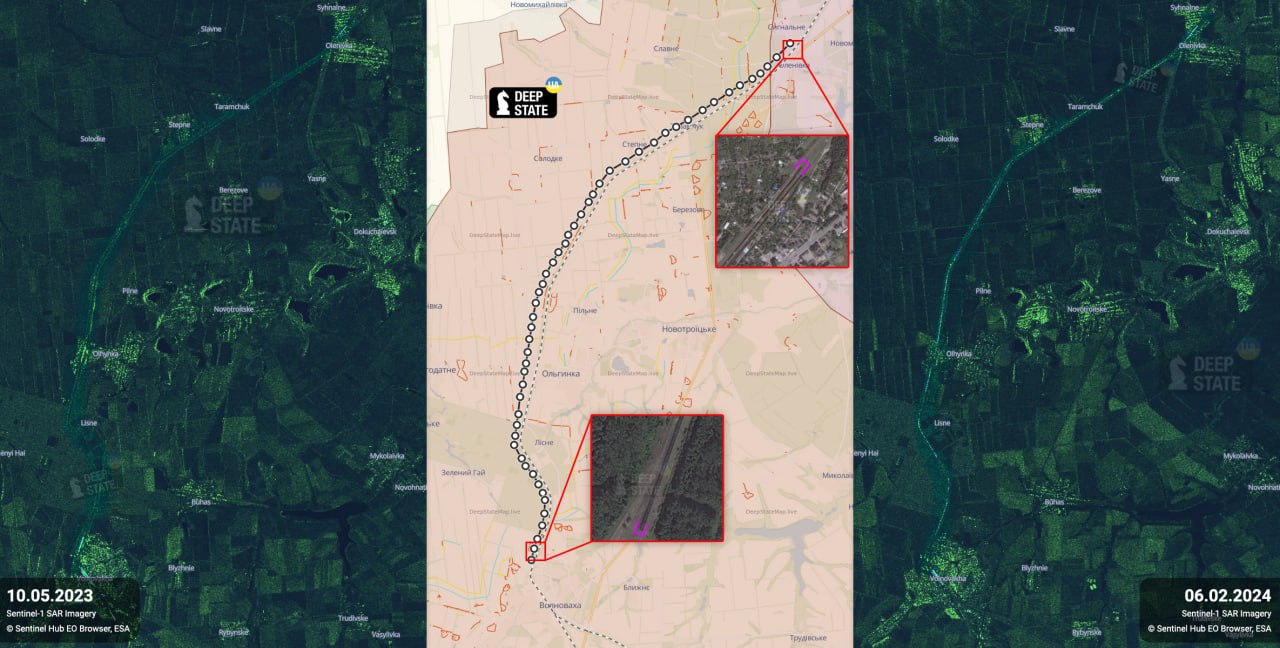ISW: Russia constructing 30-km wall of train cars in occupied Donetsk Oblast
The so-called "tsar train" may serve for the Russian military as a defensive line against future Ukrainian assaults, according to the ISW. The post ISW: Russia constructing 30-km wall of train cars in occupied Donetsk Oblast appeared first on Euromaidan Press.

Russian forces appear to have constructed a 30-kilometer-long barrier made of train cars in occupied Donetsk Oblast, possibly to serve as a defensive line against future Ukrainian military assaults, the Institute for the Study of War (ISW) said.
Russian forces reportedly may build a so-called “tsar train” as a defensive line against future Ukrainian assaults. However, ISW said it “may have been assembled for other purposes as well.”
Russian troops have put together over 2,100 freight cars into a 30-kilometer-long train since July 2023, Deep State Map, the online map of hostilities in Ukraine, reported.
The long line of train cars stretched from occupied Olenivka, south of Donetsk City, to Volnovakha, southeast of Vuhledar and north of Mariupol, the satellite imagery dated 10 May 2023, and 6, 10 February 2024 showed.
At its closest point, the railway line barricade is being erected is approximately six kilometers from the current assessed frontline southeast of Novomykhailivka. This area of Donetsk Oblast had seen “relatively little” fighting when Russia apparently started the freight car construction project, the ISW said.
Ukrainian defenders are fighting off the Russian assault on the city of Avdiivka, which is located some kilometers away from occupied Donetsk. Russia’s military reportedly started urban fighting in the Ukrainian frontline city of Avdiivka a week ago and has advanced by nearly 1 kilometer, almost reaching the supply road on the northern flank.
The DeepState has identified earlier that Russian military forces have built over 4,600 kilometers of trenches and fortifications across occupied areas in Ukraine. On average, there are four kilometers of fortifications for every one kilometer of frontline, given that the total frontline extends around 1,500 kilometers.
Other takeaways from the ISW report:
- Ukrainian military observers indicated that the Russian defense industrial base (DIB) is not as productive as Russian authorities portray it to be, but that the Russian DIB is still capable of sustaining Russia’s war effort.
- Russia’s limited DIB production capacity and insufficient serial tank production lines are not guarantees that Russia will struggle to produce enough material to sustain its war effort at its current pace or in the long term.
- Russian forces made confirmed advances near Avdiivka and western Zaporizhzhia Oblast amid continued positional engagements along the entire frontline.
- CNN reported on 11 February that Russia has recruited as many as 15,000 Nepalis to fight in Ukraine, many of whom complained about poor conditions and lack of adequate training before their deployment to the most active frontlines in Ukraine.
- Russian authorities continue efforts to solidify social control over youth and students in occupied Ukraine and to culturally indoctrinate them into Russian identity and ideology.
Read also:
- Ukraine’s Air Forces destroy 14 of 17 Russian drones, one guided missile overnight
- Consequences of reshuffle in Ukraine’s military command and Putin’s big interview
- Polish protesters to block two Ukraine border crossings again on 12 Feb
The post ISW: Russia constructing 30-km wall of train cars in occupied Donetsk Oblast appeared first on Euromaidan Press.



